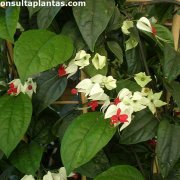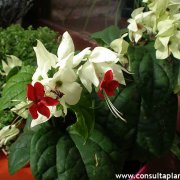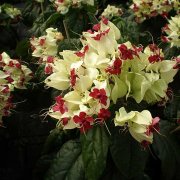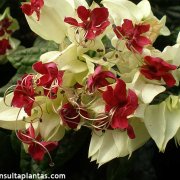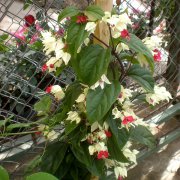Care of the indoor plant Clerodendrum thomsoniae or Bleeding-heart vine |
|
The genus Clerodendrum, family Lamiaceae, includes 300 species of shrubs, trees, and climbing plants, mostly native to southern Asia and tropical regions of Africa. Some species are: Clerodendrum thomsoniae, Clerodendrum glabrum, Clerodendrum x speciosum, Clerodendrum ugandense, Clerodendrum fragrans, Clerodendrum trichotomum, Clerodendrum paniculatum. Common names: Bleeding glory-bower, Bleeding-heart vine, Bagflower. This species is native to tropical west Africa. They are sarmentous climbing plants that reach 3 meters (9.84 feet) in height. They have large, oval, opposite leaves, with very marked dark green veins. The attractive and curious flowers appear in hanging clusters and have an ivory-white calyx and red petals. They bloom in summer. Bleeding glory-bower is used as houseplants but grow best in greenhouses. It needs supports to climb. Clerodendrum thomsoniae needs an illuminated exposure without direct sun in the central hours of the day; exposure to the east is ideal. It is a tropical plant that does not resist temperatures below 15 ºC (59 ºF). The soil must drain well and contain organic matter; Prepare a mixture, in equal parts, of leaf mulch and compost, with a little sand and peat; or a mixture of 1/3 of soil for heather, 1/3 of vegetal substrate and 1/3 of soil for geraniums. The transplant is done in early spring. Water, with lime-free water, regularly in spring and summer (every 3-4 days); reduce watering in autumn and winter (water weekly). Bleeding-heart vine does not tolerate drought or flooding. The humidity must be high; place a plate with damp stones under the pot; in summer spray the leaves with lime-free water. Fertilize biweekly with mineral fertilizer in spring and summer In late winter prune the shoots to half their length. If the humidity is low, Clerodendrum thomsoniae can be attacked by aphids, mites and whiteflies. Bagflower propagates by cuttings in late spring but it's a difficult process; it's recommended to acquire new specimens in nurseries and garden centers. |
Images of the indoor plant Clerodendrum thomsoniae or Bleeding-heart vine |
Find plants
Clerodendrum thomsoniae or Bleeding-heart vine | Care and Growing
© 2025 FavThemes
